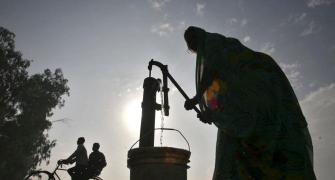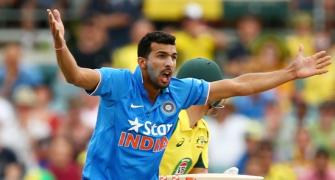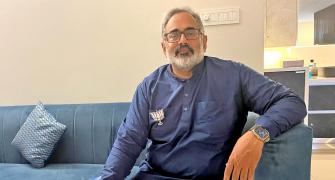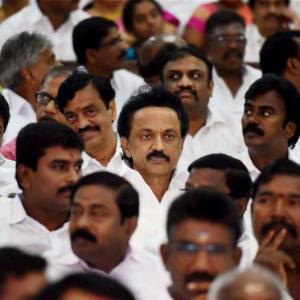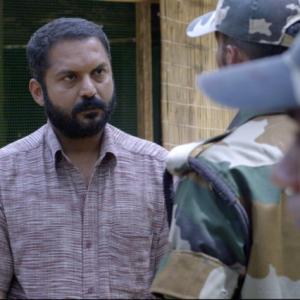The assembly polls in the state have shown that the GenNext voters want change -- not necessarily of leaderships but of their behaviour, says N Sathiya Moorthy.

In a surprising first in Dravidian Tamil Nadu, Chief Minister J Jayalalithaa’s swearing-in ceremony on May 23 passed off without a major cadre contribution from her All India Anna Dravida Munetra Kazhagam.
As visitors and TV viewers saw for themselves, there were no massive banners blocking the pavements from her Poes Garden residence to the Madras University Centenary Hall, seven kilometres away, where she was sworn in chief minister for the sixth time.
Reports have it that enthusiastic ministerial choices and others in the party hierarchy had begun putting up the banners, but quick enough, orders came from the top to remove them.
The surprise did not stop there. After the rival Dravida Munetra Kazhagam complained that backrow seats had been allotted to senior party leader and former deputy chief minister, M K Stalin, at the swearing-in ceremony, Jayalalithaa promptly issued a clarification -- again a first of its kind in the competitive Dravidian tit-for-tat ‘political culture’ of the past four decades and more.
Jayalalithaa’s statement should not be construed as an apology, but she did say that she was unaware of the arrangements in this regard.
Stalin had been allotted a seat in the 20th row -- behind losing AIADMK candidates and ministers, party campaigners, industrialists identified with the party and film personalities.
Jayalalithaa explained that she came to know about it all only after the event. Had officials brought it to her notice, she would have rectified the issue earlier itself, she said.
Stalin, though possibly smarting under the ‘insult’ after the usher had turned him away from the front rows, sat through the 20-minute-long ‘mass swearing-in’, in which Governor K Rosaiah administered oath of office to Jaya’s 28 colleagues in two batches of 14 each.
In recent years, DMK chief M Karunanidhi has shied away from accepting the leader of the opposition mantle whenever the party had won the required number of seats for the purpose -- but would readily throw his hat into the ring as chief minister if the party won.
One reason could be the need for making special seating arrangements for his wheelchair to be parked inside the well of the House. He enjoyed that facility as chief minister after becoming wheel-chair bound, between 2009 and 2011.
Some party leaders argue in private that the DMK might have lost ‘marginal seats’ this time because of his poll-eve declaration that Stalin could aspire to become chief minister only after his time -- if they won the elections this time.
A section of GenNext voters, who wanted a ‘viable change’ without ‘wasting’ their lot on a third, fourth or fifth-sixth alternative, may have been put off by this, it is argued.
These voters were also upset by the purported ‘arrogance’ of the DMK leader/leadership parading scam-tainted former minister Dayanidhi Maran on the front row, whenever and wherever Karunanidhi addressed election rallies.
It ended not because Maran Jr stayed away, or was asked to stay away. Instead, Stalin seemed to have found an alternate route by appealing to the nonagenarian father-leader not to trouble him too much in this year’s unprecedented summer heat.
That Karunanidhi readily obliged Stalin should be a testimony as much for Stalin’s persuasive power as for the intensity of this year’s summer -- which incidentally claimed at least five lives in Jayalalithaa’s poll rallies.
For some more time at the very least, the Tamil Nadu voter will be keenly watching the assembly proceedings for hints of what awaits the state, especially in terms of continuing or changing ‘political culture’.
There seems to be some realisation in the rival Dravidian camps, at least at the top levels where it matters the most (especially in the case of the AIADMK) that the GenNext voters are fed up and frustrated with their competitive antics.
The voter frustration, both in the urban and rural areas, was behind the assumptions about the emergence of a ‘third alternative’ to the two, this time round.
Between the two parties, the DMK reaped the benefits this time just as the AIADMK did in the preceding 2011 assembly polls.
Better or worse, still, the dividing line between the victor and the loser this time round is thinner than in the past.
In close to 25 constituencies, the victory margins were below 1,000 votes, and in 50, it was 5,000 votes and in 100 of the 232 that went to the polls (of the total 234), the margin was 10,000.
This was a deep dip, especially for the AIADMK which had won 37 of 39 Lok Sabha seats from the state against the perceptible ‘Modi wave’ of 2014. At the time, the party also registered massive leads in many/most of the individual assembly segments.
Better or worse, still, the numbers have a story of their own to tell, even otherwise. Between them, the AIADMK and the DMK-Congress combine have cornered close to 82 per cent of the polled vote-share.
It was also the division of non-Dravidian votes on four sides -- the PMK, Vijayakanth-led six-party front, BJP and actor-politician Seeman’s Naam Tamizhar Katchi -- that cost them all very dearly, with most other chief ministerial aspirants losing their security deposit, too.
In the 2014 LS polls, all of them together, barring the two communist parties and the NTK, had polled 17.5 per cent vote-share. G K Vasan’s Tamil Maanila Congress was then a part of the Congress parent.
The question thus remains, if Prime Minister Narendra Modi could re-think his Bharatiya Janata Party’s Tamil Nadu poll strategy between now and 2019, and to bring as many of them as possible together, if any larger alliance with either of the two Dravidian majors become unfeasible all over again.
Now, he would require either of the Big Two, or a collective of the erstwhile NDA partners from the state (minus the ideological communist rivals) to make whatever electoral sense as possible -- but the possibility cannot be ruled out either, if any or all of them still have a ‘staying capacity’.
In metropolitan Chennai, the DMK won 10 out of the total 16, attributable purportedly to the Jaya government’s mishandling of the ‘great floods’ only months earlier.
But it may have also owed to the AIADMK’s choice of uppity, at times ageing ‘outsider-candidates’ in some constituencies. The fielding of AIADMK ministers who had concentrated all their flood time energies to Amma’s R K Nagar constituency and not to their own, also mattered.
Yet, the fact remained that the poll percentage in the city was low, and pulled down the state’s average, too.
This included Jaya’s R K Nagar and Stalin’s Kolathur.
As the polling figures showed, Chennai’s famous ‘urban middle class’ and its own share of ‘young, urban voters’ had stayed away, too.
They seemed to have been influenced by their possible lack of faith in the Big Two still -- and their conviction that neither of the rest would make the grade.
It’s thus that a lesson has dawned on the two major parties that the dividing line between their ‘collective survival’ into the future depended on each other at one level and on the thinking of GenNext voters, who want change -- not necessarily of leaderships, but of their behaviour.
Whether this late realisation that the ‘people are watching’ would extend to governance issues, including corruption, remains to be seen.
In the past, in the absence of a strong opposition, especially inside the state assembly, nothing had stopped the party in power to deliver on promises and free the state of corruption and corrupt practices.
Today, a strong opposition in the state assembly seems to be heralding change in political culture. But more so, and unacknowledged, perceptions of the voter mood, is a greater contributing factor just now, than at any time in the past.
N Sathiya Moorthy, veteran journalist and political analyst, is director, Observer Research Foundation, Chennai chapter.

